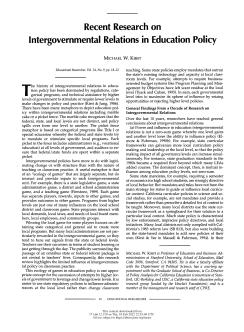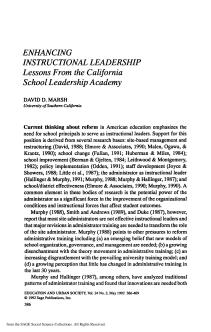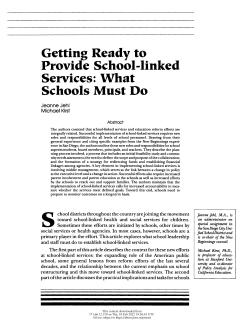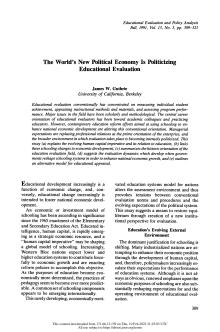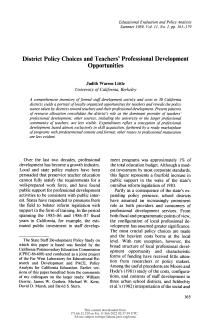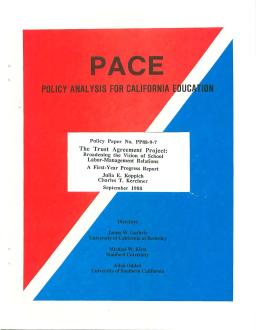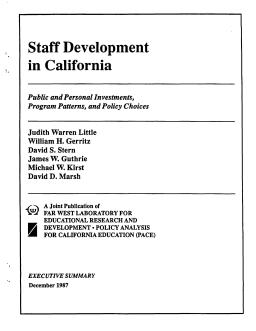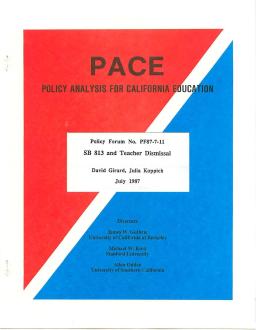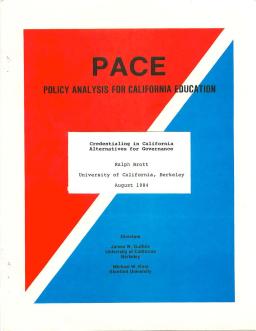Published
Summary
Intergovernmental relations in education policy are dominated by regulations, programs, and technical assistance. A metaphor called "ecology of games" captures how each level of government maximizes its influence, affecting state and local policy-making. Classroom practice is limitedly influenced by intergovernmental policy, as local demands, taxes, and needs also play a role. State policies are easier to influence administrators than to change teaching. Each level of government tries to maximize its sphere of influence.
Lessons from the California School Leadership Academy
Published
Summary
American education reform stresses the importance of principals as instructional leaders, but most are not effective in this role. Research suggests that innovative administrator training is needed to transform the role of site administrators. Content and process criteria have been identified, and several state-sponsored training programs have been established to meet them. One such program is the California School Leadership Academy, which provides a three-year program for aspiring and practicing site administrators with an emphasis on instructional leadership.
What Schools Must Do
Published
Summary
This article contends that school-linked services and education reform efforts are integrally related. Successful implementation of school-linked services requires new roles and responsibilities for all levels of school personnel. Drawing on general experience and citing specific examples from the New Beginnings experience in San Diego, the article outlines these new roles and responsibilities for school superintendents, board members, principals, and teachers. It describes the planning process involved, a process that includes an initial feasibility study and community needs assessment; a...
Published
Summary
Traditionally, educational evaluation has focused on measuring student achievement and program performance. However, education reforms are now linking schooling to economic development, leading to a shift towards managerial expectations and politicization of the field. This article explains the human capital imperative and its relation to education, summarizes the history of educational evaluation, and outlines an alternative model for educational appraisal in the context of government-led education system reforms aimed at enhancing national economic growth.
Published
Summary
An inventory of 30 California districts reveals their policy stance on teacher professional development, which primarily consists of skill acquisition through district-led programs. Other sources, such as universities or professional communities, are less visible. The districts are the dominant providers of development opportunities, with expenditures reflecting a ready marketplace of predetermined programs. Alternative routes to professional growth are less evident.
Broadening the Vision of School Labor-Management Relations—A First-Year Progress Report
Published
Summary
The Trust Agreement Project aimed to develop new forms of school organization and relationships among teachers and administrators. Six California school districts participated, each selecting an educational policy area for trust agreement development. Trust agreements produced role changes, fostered collaboration, and altered decision-making. These initial results show promise in leaping school districts from the 19th-century industrial model to a more appropriate 21st-century model.
Public and Personal Investments, Program Patterns, and Policy Choices—Executive Summary
Published
Summary
The California Staff Development Policy Study was initiated to assess the possibilities and limitations of staff development in improving classroom teaching and learning. The study aims to answer four questions related to California's investment in staff development, how staff development activities are administered, and how teachers and administrators judge their effectiveness. The study yields eight main conclusions, presented in terms of investment and focusing on improving the capacities and commitments of California's educators.
Published
Summary
In 1985, the Policy Analysis for California Education (PACE) convened a group of attorneys and education policy experts to discuss the effect of Senate Bill 813 on teacher dismissal. They explored varying interpretations of its provisions, contrasted practical experiences with legislative intentions, and outlined recommendations to improve the dismissal process. This summary analysis includes a brief discussion of relevant court rulings and no attempt has been made to update the information since its initial publication.
Published
Summary
This study examines consolidation's impact on student achievement in California. It finds that consolidation leads to improved educational opportunities and cost savings. Consolidation benefits low-income and minority students and has a greater impact in rural areas. Although drawbacks exist, consolidation can be an effective strategy for enhancing education. These findings offer valuable insights for policymakers and education leaders seeking to improve student outcomes in their districts.
